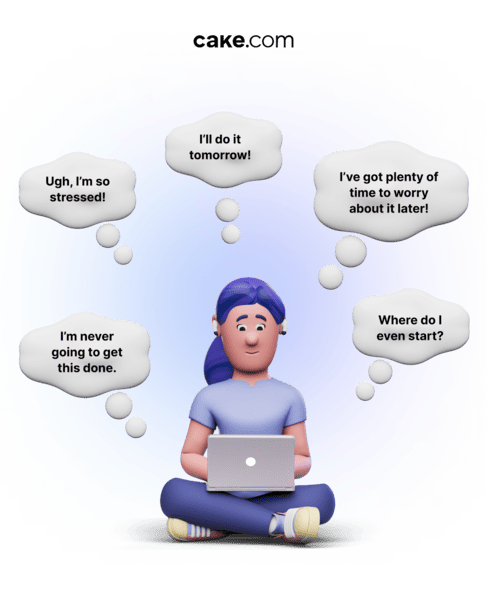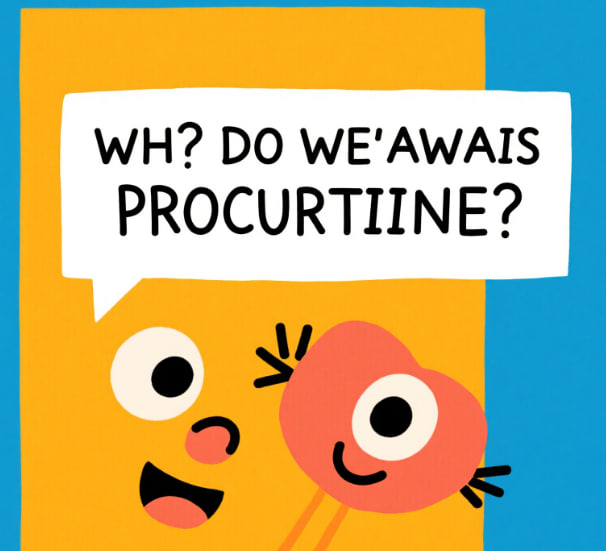Have you ever been in a situation where you were supposed to write a report or prepare a work document, but instead spent hours sorting through the kitchen cabinets in alphabetical order and wiping down every jar? If so, you might think you’re being lazy, but it’s far from lazy.
You should know that it takes concentration and physical strength to organise your organisers, and this kind of behaviour is more a reflection of how serious you are about things, rather than laziness. You’re not hanging out, you’re not watching TV shows, you’re doing something – it’s just ‘avoidance’. This kind of behaviour is called ‘procrastination’ in psychology.
So what is procrastination? What is the difference between it and laziness? And how do we deal with this recurring behavioural pattern?
Procrastination is a form of self-harm
Linguistically, the word ‘procrastination’ comes from the Latin word “procrastinare”, which means ‘to put off until tomorrow’. The word ‘procrastinare’ comes from the Latin word “procrastinare”, which means ‘to put off until tomorrow’. But it’s not just ‘wait and do it’, it also has a psychological dimension: knowing that something should be done, and having the ability to do it, but selectively bypassing it.

According to psychologist Piers Steel, procrastination is actually a form of self-harm. When we procrastinate, it’s not that we don’t realise there’s a problem, it’s that we choose not to face it, knowing that it will have negative consequences.
Another expert on procrastination, Professor Fuschia Sirois, also says that procrastination is irrational. People know that doing something is good for them, but when they think of the discomfort it might cause, they make excuses to avoid it. This is an emotional avoidance response.
The Nature of Procrastination: It’s Not About Time, It’s About Emotions
We often blame procrastination on ‘not scheduling’ or ‘being too inefficient,’ but that’s not true. Psychological research shows that the real root cause of procrastination is emotional regulation.
Have you ever noticed that the tasks that are easiest to procrastinate on are often accompanied by negative emotions? Things like anxiety, restlessness, boredom, stress, self-doubt, and so on. When faced with these feelings, we subconsciously want to run away, so we choose to do something that ‘seems to work’ first, such as cleaning, tidying up, making a cup of tea.
According to a study conducted by psychologist Tim Pychyl, people don’t procrastinate out of laziness, but rather out of a need for short-term emotional repair. In other words, we’re not rejecting the task itself, but rather avoiding the emotional burden it brings.
Procrastination is an ‘instant gratification’ reward system
When you successfully ‘escape’ from an anxious task to sort out a drawer or brush up on a video, you’re actually getting an instant psychological reward – relaxation, relief, comfort. -Relaxation, ease, comfort.
Professor Fuschia Sirois points out that this fleeting sense of psychological comfort is the key to the habitual nature of procrastination. Your brain registers, ‘It’s easier for me not to do this instead.’ Over time, the avoidance is reinforced and procrastination becomes an automatic response.
This is similar to ‘positive reinforcement’ in behavioural psychology. When a behaviour brings about a positive feeling, our brains tend to repeat it. So, time and time again, you put off important tasks, each time gaining a short-lived sense of security, which only exacerbates the problem in the long run.
The Vicious Cycle of Procrastination: Stress→Avoidance→Guilt→Avoidance again
The worst thing about procrastination is that it tends to create an emotional vicious cycle:
These internal tugs and mood swings are known in psychology as Procrastinatory Cognitions. Your mind is filled with questions like, ‘Why am I procrastinating again?’ ‘Am I hopeless?’ ‘Everyone else is better than me.’ These thoughts only add to the mental burden and the procrastination behaviour gets worse.
Why are we more likely to procrastinate ‘to feel better’?
There is a key psychological mechanism behind this – the ‘present moment preference’. We have evolved to value short-term benefits over long-term rewards. After all, ancient humans needed immediate food and security, not a performance review three months later.
Psychologist Hal Hershfield did a neuroscience study and found that when we think about our ‘future selves,’ the areas of our brain that are activated are similar to those that are activated when we imagine a stranger. In other words, when faced with a long-term task, we subconsciously think, ‘That’s someone else’s business,’ and I just want to be comfortable right now.
This explains why we continue to procrastinate even when we know that doing the task later will make it worse.
Our brains are more likely to ‘short-circuit’ in the face of stress.
When a task triggers strong feelings of unease, failure, or self-doubt, the amygdala (the emotional control centre) in the brain ‘calls the police’ and treats it as a threat. As a result, we instinctively want to run away as if we were in danger – even if it’s just sitting at a desk looking at a blank document.
Psychologists call this phenomenon ‘amygdala hijacking’. That is, we rationally know what to do, but our emotions have taken over. The more you force yourself to do something, the easier it is to fall into helplessness.
The solution to procrastination: not controlling time, but regulating emotions
Many people try to fight procrastination with time management apps, to-do lists, and the tomato work method, but these can only solve the surface problem.
What can really make us change our procrastination behaviour is the understanding and management of emotions.
According to Dr Judson Brewer, a psychoneurologist at Brown University, ‘If your brain gets used to the relaxing rewards that come with procrastination, it will keep repeating the behaviour until you offer a better alternative.’
That said, we must find a way to handle tasks without triggering intense emotional stress. For example, you can break the task into smaller steps to reduce the mental load, or change to a more relaxing environment to reduce stress.
Two effective methods: self-forgiveness and self-compassion
Psychological research has found that those who can forgive themselves for past procrastination are more likely to procrastinate less the next time they take action.
In a 2010 study, it was noted that students who forgave themselves for procrastinating before revision were more proactive in their revision leading up to final exams. This is because forgiveness reduces feelings of self-blame and allows us to move on from failure.
Another useful approach is self-compassion. This is not about condoning inaction, but about stopping blaming yourself when you face setbacks or failures and treating yourself with understanding and forgiveness as you would a friend.
Research has shown that self-compassion not only reduces psychological stress, but also enhances positive emotions and increases initiative and efficiency in doing things. It is a force that can change our behaviour from within.
Conclusion: Instead of being harsh, we should understand
Procrastination is not laziness or an ability problem, but an emotional defence mechanism. When we understand this, we will no longer be caught up in the ‘am I not good enough’ spiral of self-blame.
To break the cycle of procrastination, we don’t need more apps, we need to pay more attention to our inner feelings and learn to treat ourselves with kindness and patience.
So the next time you’re tempted to start organising your drawers or flicking through online shopping sites again, stop for a moment and ask yourself: what am I avoiding? What am I feeling right now? Perhaps, then, you’ve found the key to breaking your procrastination.

